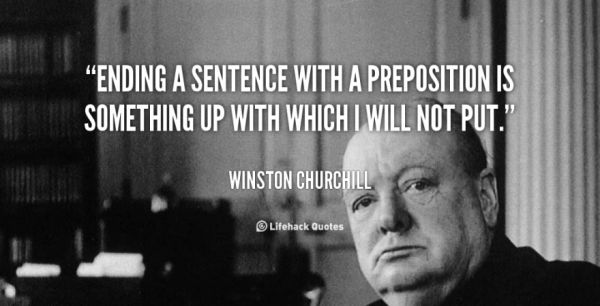
If you're one of those people who goes around correcting the grammar, spelling and word usage of others, take heed: you may want to double-check those "hard and fast" rules. Author Lauren Davis wrote an article for i09 in which she discusses ten often corrected "mistakes" that are subjective at worst. Let's take ending a sentence with a preposition, for example. Davis has this to say about that grammatical situation,
"There's a cheeky sentence on the matter that is frequently (and apocryphally) attributed to Winston Churchill: "This is the sort of bloody nonsense up with which I will not put." Soanes offers four examples of when it is perfectly alright (and perhaps even preferable) to end one's sentence with a preposition:Here you have it: an apocryphal graphic quotation at top and some schooling underneath. Read the rest of Davis' article here.
-passive structures (she enjoys being fussed over)
-relative clauses (they must be convinced of the commitment that they are taking on)
-infinitive structures (Tom had no-one to play with)
-questions beginning with who, where, what, etc. (what music are you interested in?)
Fogarty adds that the one case in which you want to avoid ending a sentence with a preposition, at least in formal writing, is when the meaning of the sentence doesn't change when you drop the preposition, e.g. "Where are you going?" instead of "Where are you going to?" But in informal spoken English, you will see such phrases, especially in certain dialects."

No comments:
Post a Comment